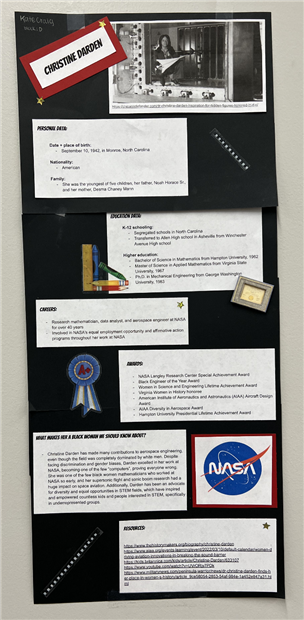

Upper School Black History Month Units
Source/Author: Raffi Darrow, Ebytes Editor
February 24, 2023
February is Black History Month, a federally recognized, national commemoration of the contributions of people of the African diaspora. At Shorecrest, faculty across grade levels and disciplines found developmentally-appropriate ways to promote awareness, equity, and social change related to Black History Month in their classrooms while honoring the perspectives, legacies and contemporary achievements of people of the African Diaspora. Some of the units of study and projects in Upper School included:
Upper School English Teacher, Ms. Elouej, hosted the 2nd Annual Black Authors Read-In at Shorecrest. All members of the Shorecrest community were invited to celebrate the literary achievements of Black authors. Mrs. Brazee also promoted literary works. She curated a "Black History Month Lending Library" in her Social Studies classroom. Book subjects ranged from the early civil rights movement to the history of hip-hop. Students were free to take books to read or just stop by and browse through them.
Dr. Bullock’s Pre-Calculus students created posters highlighting Black Women in science and math careers that they researched. Historically marginalized and underrepresented groups have often been overlooked and/or not encouraged to equally and equitably participate in technical fields of study or of work. In particular, we acknowledge an historical absence of women in STEAM fields. The purpose of this project was threefold: for students to gain historical knowledge, for students to better understand the significance of Black women in these fields, and for students to educate others on contributions of the women whom they researched. The posters are hanging in the hallway on the 2nd floor of Charger Commons.
Filmmaking Teacher Allison Roberts shared short films and film clips that tied in with current student film projects produced by three contemporary, Black art filmmakers. The works included "Afronauts," an award winning short film by Ghanian filmmaker Frances Bodomo; "A Faint Notion" and "Staying Afloat" by Brooklyn born multimedia artist Kambui Olujimi; and excerpts from Ain Bailey's work "Untitled (Wedding)" that Roberts recorded last summer during her visit to the exhibition "Black Melancholia" that was held June 25-Oct 16, 2022 at the Hessel Museum of Art at Bard College.
Mr. Moya’s Global Studies students just finished their unit on Africa, which included reading and discussing an ancient African epic on Sundiata Keita, founder of the Malian empire (on whom “The Lion King” may have been based). For their final project, students were required to record themselves telling their own griot's tale (a griot is a traditional oral storyteller), which incorporated details about Africa's history and culture. In U.S. History classes, students focused on Black discrimination in the ‘50s and the Civil Rights Movement.
Shakespeare's Othello opened uncomfortable and necessary discussions in Mr. Seymour’s honors tenth grade English class. “We discuss how the European slave trade was well underway when Shakespeare wrote the play, but the idea of race and racism, as we know it today, had yet to be conceived,” Seymour shared. The Othello Project also broaches conversations about why the American Minstrel Tradition makes the painting of one's face to represent African, or any other heritage, offensive.
Mr. Gonzalez teaches Honors American Literature. His students read Nella Larsen's “Passing” and examined how the characters navigated race, class, and conceptions of femininity in 1920s America. Students looked through critical lenses of class, race, and gender to interpret character motivations in Larsen's work. In the end they discussed how “Passing” is an emblematic work of the Harlem Renaissance.
Students in Ms. Estramera’s AP Computer Science Principles class have been examining Algorithm Bias and racial recognition software that favors white users. Some examples are the racist implications of Twitter's auto-cropping algorithm and Google Images’ AI. They also consider ways to try and reduce bias in technology and acknowledge lessons they have learned from these experiences.
These are just some examples of how Chargers were thinking critically throughout Black History month. Read about some Middle School units and projects.
























